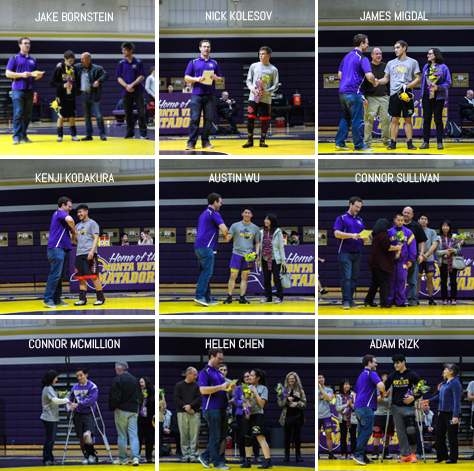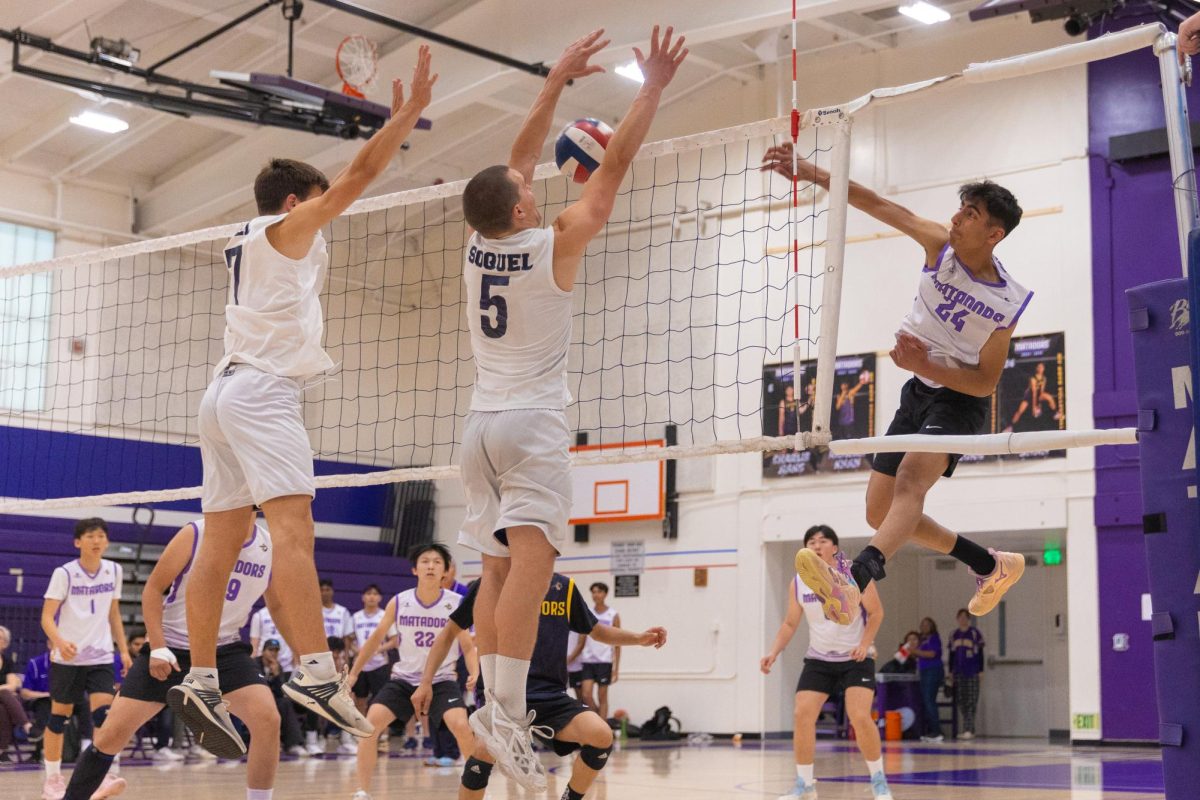
Thirty seconds into the first period, senior Austin Wu threw his opponent on the ground. The large thud made by the fallen wrestler elicited excited cheers from the crowd. After the match was over, some of the phrases audience murmured on the stands include “good fight” and “battle of the night.”
On Feb. 2 at 5:30 p.m. in the gym, the wrestling team went head-to-head against Los Gatos HS for their senior night. MVHS won 40-33. With two dual meets left and a league championship, the wrestling season is nearing the end.
“They’re really starting to clean up their wrestling and making less and less mistakes,” head coach Ian Bork said. “On the team right now, everyone’s pretty excited to be there. We’re finding our identity, and it happens during this time of the year.”

All the senior wrestlers lined up before the varsity matches start. Bork named each wrestler individually and asked their parents to join them on the mat. He gave them a bouquet of flowers and talked about their accomplishments, role on the team, and their future plans for college.
“We’re certainly going to miss our nine seniors,” Bork said. “They’re going to move on to bigger and better things than high school athletics. Colleges, careers, jobs, families. They’ve got more exciting things on the horizon so this is a nice stop along the way.”
Several top performing wrestlers of the night include Wu and seniors Kenji Kadokura, Nick Kolesov, Jake Bornstein and James Migdal.
The whole gym clamored over Wu’s match. Wu is a point scorer, which is what assistant coach Max Rosefigura thinks makes Wu such an exciting wrestler. According to Rosefigura, in all sports when they score more points, they become more popular. Baseball, football and basketball can attribute its prominence to its high scoring nature.
“[Wu] is always looking for a fall,” Rosefigura said. “Sometimes to the detriment of his own match because the other guy scores because [Wu] is trying to toss the guy. Even though that match, he didn’t necessarily win it, he still got the team going. Everyone was excited.”
Wu felt like he was able to win, but his low endurance showed through at the end. He was in Japan for a week before the dual meet and he didn’t train during that period of time. Two weeks ago at a tournament, he had a rib bruise which still affects him.
“That came up in the end and I couldn’t wrestle anymore,” Wu said. “I gave up and I lost. If I was in a regular condition for wrestling, I could have beaten him pretty easily.”

Injuries showed through in the match right after Wu’s. During third period, Kadokura had leg cramps and paused the match to get stretched by the coaches. He recovered after Bork helped him stand up.
“The first half, I felt pretty good because I was in control most of time,” Kadokura said. “But then, I got leg cramps, and it was excruciatingly painful. It was difficult to stand up and put pressure on top.”
After his injury, he focused on takedowns. Instead of coasting through the remainder of the match, he won five additional points for the team. According to Rosefigura, Kadokura wrestled a “textbook match.” His match comprised of what the coaches taught, such as getting the first takedown and being the last person to score each period.
“He did basically all three periods at every opportunity,” Rosefigura said. “It was really a match that the coaches look to see. ”
Because Kadokura was cutting weight for his weight class, he was dehydrated before his match. He did not rehydrate well enough, leading to leg cramps. He learned to drink plenty more water and a bit of Gatorade next time, but nothing too too loaded with sugar which he enjoys to drink.
“I drank chocolate milk and apple juice,” Kadokura said, looking around beforehand to make sure the coach is out of sight. “Not a good combo.”

Like Kadokura, Kolesov could have coasted through his match, but he still got the last takedown. Kolesov wrestled someone 20 pounds heavier and at the end, he started moving slower because he was worn out from the significantly heavier opponent.
“[Kolesov] always appreciates a challenge and never backs down from one,” Rosefigura said. “Maybe not ideal for his personal success, but he found a way to make it about his success and get it done.”
Kolesov has wrestled two weights up before a couple of times before. He finds that to wrestle someone heavier, he needs to constantly stay in motion to avoid getting caught under the bigger person. Some of the things that went well in his match was that he was standing and getting takedowns, but he thinks he could have been more on top or bottom of his opponent.

Wrestling is not a sport in which each individual on the team receives fame, so senior night is an important way to recognize the seniors who worked hard. Rarely do people go on to professional wrestling because wrestling is not as mainstream and doesn’t generate as much revenue as the other sports. Bork believes this to be the cultural place of the sport. He thinks that is why some wrestlers are not looking for the spotlight and can appreciate all the hard work it takes to refine their skills.
“So you attract people who aren’t doing it so they can get their name announced over a loudspeaker or have cheerleaders swooning over them,” Bork said. “This is wrestling. Nobody cares, except your parents, yourself and your teammates. That’s the glory of it. It’s its own innate reward.”
At the end of the dual meet, friends of various wrestlers came down from the stands meet to give handmade posters and small gifts for support.
“We’re excited to see them apply what they learned here to the next phase in their life,” Bork said. “That’s certainly the bigger focus for us: preparing these young men for life, not just for athletics. Wrestling is our teaching vehicle for us to share what’s been important to us and what’s helpful to us as people.”







